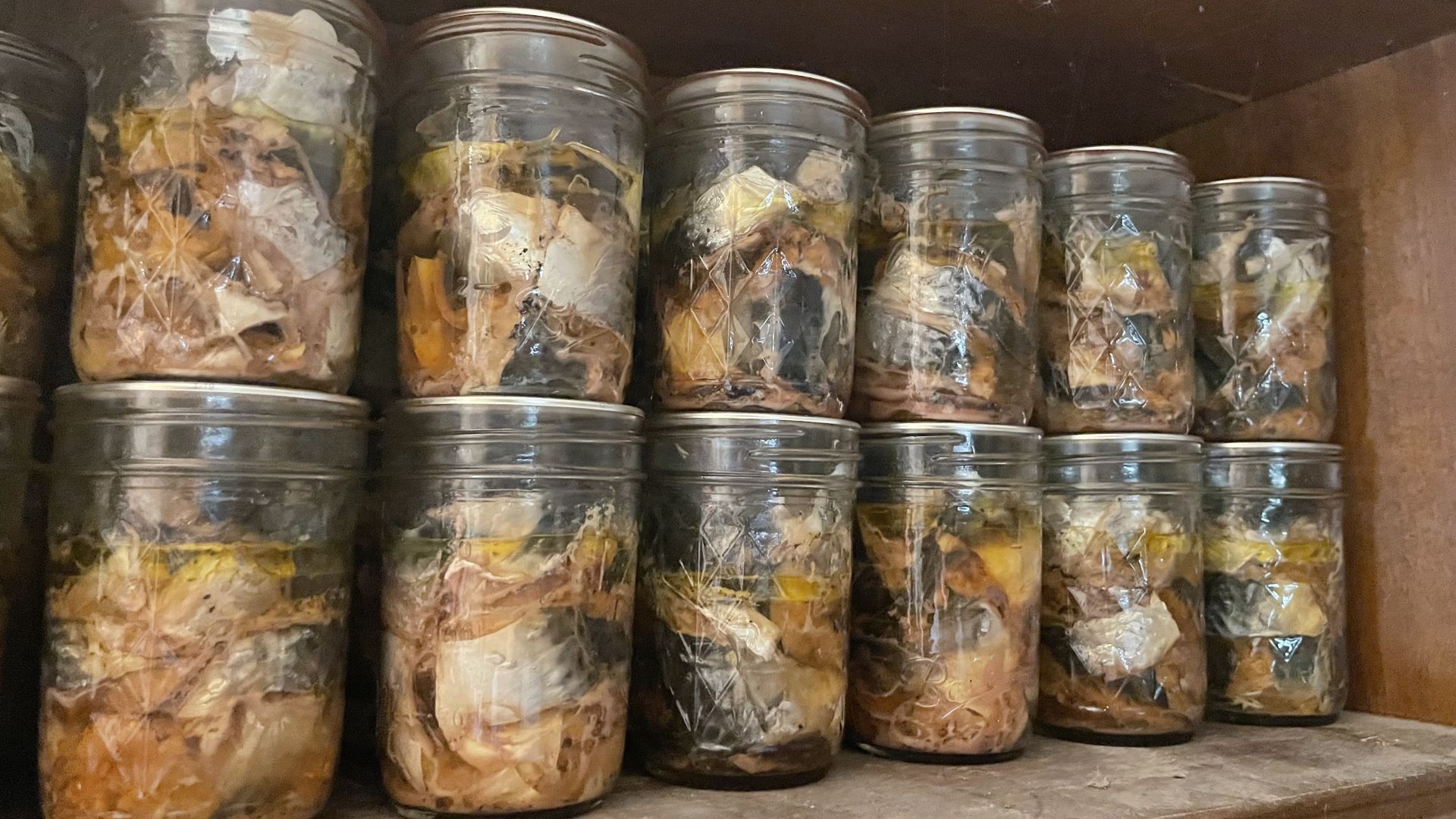Over the last couple of decades, Jamie and Aura Moore have cobbled together a living for their family of six, doing everything from lobster fishing, chimney sweeping and photography, to restaurant work, midwifery and carpentry.
They even nibbled for awhile at a bunny food business.
The philosophy of life for this couple is a little like Jamie’s approach to his primary occupation of carpentry.
“It’s a whole different way of thinking,” said Jamie Moore, who also writes poetry. “It’s all about following the laws of the wood, working with it, and being able to keep stuff from falling apart on you.”
The family’s six-acre Machias homestead, perched along a brook that meanders into Little Kennebec Bay, is rife with symbolism that captures their tenacious way of life; from the rutted, winding road leading to their modest farmhouse, stretched over the years with salvaged lumber, to the home’s overflowing pantries of canned foods preserved from bountiful gardens.
The couple, Jamie now 52 years old and Aura 44, bought the home about a decade ago with $48,000 in cash, saved over the years by renovating and leapfrogging from house to house, doing all of the work themselves.
Jamie said he knew nothing about construction when they bought and renovated their first house. The only tool he had was an axe left by the previous owners.
It hasn’t gotten much easier.
“After we closed on this house, we had six dollars left in our bank account. We said, ‘OK kids, let’s go to Dunkin Donuts and celebrate — each of us gets a donut!’” Jamie laughed. Aura quickly corrected him, remembering they could only afford donut holes.

Their precipitous tenacity is not a new story Downeast. For many, it is the story.
Washington County, with a poverty rate hovering just below 20 percent, consistently falls within the three poorest counties in the state.
With a population of 31,437, according to the U.S. Census Data for 2022, less than a quarter of residents hold a bachelor’s degree or higher.
Roughly half of the working-age population is even counted in the civilian (non-public-sector) labor force.
About a third of those workers are classified, like the Moores, as self-employed — the so-called “gig economy” — based on data from the U.S. Bureau of Economic Analysis and the U.S. Bureau of Labor Statistics.
These dogged statistics exist despite the region’s rich abundance of natural resources, including lobster and other fisheries, lumber, and wild blueberries, industries that would presume a wealth of good-paying traditional employment opportunities.
The problem is these seemingly good-paying jobs come and go with the seasons.
“You have to be creative to come up with something to be able to survive,” said Jamie Moore. “Usually you’ve got to have two or three things going on. You have to be willing to do whatever you have to do.”
To make ends meet, Jamie and Aura — who also homeschool their children, are renovating their house, and building another house for their oldest daughter, Praise, and her husband — have to scrimp and work a variety of jobs.
Jamie builds custom furniture, does construction and sweeps chimneys. Aura pitches in with her professional photography, and by growing and canning nearly all the family’s food, including meat and fish.
The kids also pitch in, with sons Seamus and Sean helping with salvage and building projects. For about five years, 18-year-old daughter Gracie ran a successful rabbit food business, doing everything from the foraging to the package design, that also helped keep the family afloat.
According the U.S. Census Bureau American Community Survey, only 37 percent of Washington County’s two-adult, two-children households (the most commonly used benchmark) are making the approximately $96,000 annual living wage the Massachusetts Institute of Technology (MIT) Living Wage Calculator estimates is needed in Washington County to afford basic necessities, such as food, child care, health insurance, housing and transportation.
Despite assiduous efforts, the Moore household’s income, with three children still living at home, falls far short of even the lower benchmark living wage.

It’s an economic reality recognized by many community leaders, including the Sunrise County Economic Council. The nonprofit organization works with municipalities, businesses and other nonprofits to create jobs and bolster prosperity in the county.
During a SCEC web presentation in March giving an update on the county’s economy, the group’s executive director, Charles Rudelitch, said native Downeasters tend to perceive the ebb and flow of seasonal employment as natural.
But he said it’s not, adding it’s a real challenge for small businesses to make a profit and for individuals to make a living wage when demand for goods and services varies so much during the year.
Despite the region’s economic challenges, Rudelitch said the personal income reported by the U.S. Bureau of Economic Analysis and the U.S. Bureau of Labor Statistics for Washington County in 2021 was a surprising $1.5 billion.
“It’s easy in Washington County to focus on how the county performs poorly relative to other parts of Maine and New England, but there’s an awful lot of economic activity here,” Rudelitch said during the presentation. “It’s important to remember just how important self-employment is in the county.”
The SCEC recently opened its MaineStreet Business Building in Machias, hoping to foster the region’s entrepreneurial spirit.
The center provides small businesses with low rent, digitally connected office spaces, and professional support and training. A partnership with Washington County Community College offers two free online successive credit-bearing courses, covering the fundamentals of running a business.
Katie Bragg, the director of small business and entrepreneurship for the SCEC, said there’s already great interest from people who want to grow a hobby into a sustainable business. But the training also provides a reality check.
“Sometimes people are told if you do something that you’re passionate about, it will be wonderful all the time and that’s not the case, it’s not always fun,” Bragg said.
Another focus for the SCEC is building a broader economic foundation for the county.
The organization supports larger existing and emerging industries, such as the $110 million Kingfish land-based aquaculture facility being built on Chandler Bay in Jonesport. Given the green light after several permit challenges, the company is projected to create 70 year-round, living-wage jobs and 100 temporary construction jobs.

That could be a boon for people looking for a full-time career, and for gig construction workers like Jamie Moore, who is always hunting for work close to home.
Over the last couple of years, Moore has spent weeks and often months away, traveling as far as New Hampshire to take remodeling and construction jobs.
He admits it’s hard for the family to be separated, and the high cost of gas, as well as the wear and tear on their two vehicles (a 2003 Honda CRV and a 2012 Subaru Forester) eats into his earnings.
But for Moore — who spent about eight years making what he called decent money as a lobster fisherman and another three dragging for scallops in Maine’s icy waters — it’s worth the trade-off.
“It was really hard being out there, sticking your hands in the dead fish, it would just turn my stomach so bad,” Jamie said. “I just kept telling myself I gotta go back, I gotta go back. I’ve just got to do it.”
Eventually the money he was able to earn as a furniture and cabinet maker lured him from the water and those heftier, at least seasonally, steady paychecks.
These days Jamie concentrates on the larger construction jobs because he can make more money. He said trying to make a living building custom furniture isn’t a viable career Downeast, where so many others are also scraping to get by.
“I just didn’t have the heart,” he said. “People wanted a table, and I was like, I want them to have a table! So I would charge them what they could afford.”
That sense of fairness is a core principle for Jamie and Aura, who place their faith in God and their commitment to the Golden Rule at the center of all they do.

For the Moores, sometimes donating or bartering work and volunteering their time have to be factored into their personal “living wage” formula. For example, Aura spent three weeks in Uganda four years ago, volunteering her professional photography skills at a nonprofit birthing center.
Not only did her photography help generate donations for the center that provides critical maternity services in the impoverished country, but the experience also motivated Aura to come home and begin a new kind of journey.
She decided to earn a Bachelor of Science degree as a certified midwife, and for the last four years has traveled back and forth to Bangor for classes and for her preceptorship, requiring participation in more than 50 births.
She graduated this month, welcomed home by a massive wood sign her husband erected in their field by the road that was hand-painted by her artistic children with flowers and the words “Congratulations Mama.”
Although her new profession will bring in some much-needed additional income, the couple knows the family likely still will be scraping by, having to do most things themselves, do with less or simply do without.
They’ll still have to leave the county for work too, at least for a while. For the next two years, Aura will live with a family in Bangor every other week to begin her midwife career at a birthing center; Washington County doesn’t have a stand-alone birthing facility.
But it still won’t be a steady income. As a certified, experienced midwife with a four-year degree, Aura will be paid only hourly for prenatal visits and a set fee for each birth. Still, neither she nor Jamie regret their occupational choices.
“We’ve always had times of abundance and times when it’s been pinched,” Aura said. “But we have been very blessed and we’re both just doing what we love.”
Jamie agreed, adding that making a living sort of on the fly — one gig, one piece of furniture, one birth at a time — isn’t for everyone.
“I don’t want to in any way make it look like it’s easy for us,” he said. “None of it is perfectly organized and on schedule. But it gets done.”







